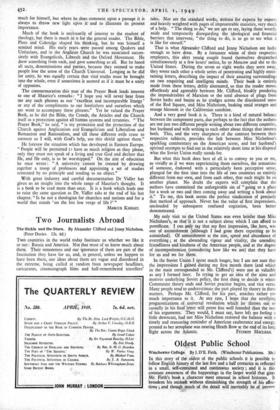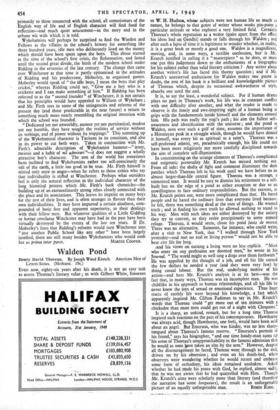Oldest. Public School
Winchester College. By J. D'E. Firth. (Winchester Publications. 30s.)
IN this story of the oldest of the public schools it is possible to follow English history of the last five and a half centuries as reflected in a small. self-contained and continuous society ; and it is this constant awareness of the happenings in the larger world that gives Mr. Firth's book a character most unusual in school histories. It broadens his outlook without diminishing the strength of his affec- tions ; and though much of the detail will inevitably be of interest
primarily to those connected with the school, all connoisseurs of the English way of life and of English character will find food for reflection—and much quiet amusement—in the story and in the urbane wit with which it is told.
Wykehamists will perhaps be surprised to find the Warden and Fellows as the villains in the school's history for something like three hundred years, idle men who deliberately lived on the money which should have been spent upon the boys. This abuse started at the time of the school's first crisis, the Reformation, and lasted until the second great divide, the birth of the modern school under Ridding in the seventies of the last century. The change that came over Winchester at that time is partly epitomised in the attitudes of Ridding and his predecessor, Moberley, to organised games. Moberley would speak of " the idle boys, I mean the boys that play cricket," whereas Ridding could say, " Give me a boy who is a cricketer and I can make something of him." If Ridding has been referred to as the " second founder " of Winchester, it is not certain that his principles would have appealed to William of Wykeham ; and Mr. Firth sees in some of the stringencies and reforms of the present day (and those predictable in the near future) a return to something much more nearly resembling the original intention with which the school was founded.
" Dedicated yet not unworldly, austere yet not purnitanical, modest yet not humble, they have sought the realities of service without its verbiage, and of power without its trappings." This summing up of the Wykehamical character is Tacitean in its concision, and also in its power to cut both ways. Taken in conjunction with Mr. Firth's admirable description of Wykehamist humour—" irony, meiosis and a habit of nil admirari "—it does not suggest a wholly attractive boy's character. The rest of the world has sometimes been inclined to find Wykehamists rather too self-consciously the salt of the earth, a little too good to be true. Mr. Firth himself is stirred only once to anger—when he refers to those critics who say that individuality is stifled at Winchester. Perhaps what outsiders feel is only the natural reflection in the individual character of the long historical process which Mr. Firth's book chronicles—the building up of an extraordinarily strong ethos closely connected with the place and its associations. This leaves its imprint on many boys for the rest of their lives, and is often stronger in flavour than their own individualities. It may have imparted a certain aloofness, com- pounded of basic fear and apparent superiority, to their dealings with their fellow men. But whatever qualities of a Little Gidding or hortus conclusus Winchester may have had in the past have been virtually destroyed by the events of the last ten years. If Dr. Moberley's fears that Ridding's reforms would turn Winchester into " just another Public School like any other " have been largely justified, there are still many besides Wykehamists who would rank







































 Previous page
Previous page